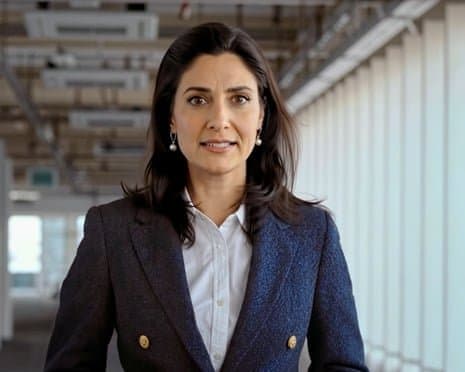Channel 4's Dispatches documentary 'Will AI Take My Job?' featured Britain's first fully AI-generated presenter, Aisha Gaban, while simultaneously exploring AI's threat to 8 million UK jobs. The uncanny experiment highlighted rapid advancements in synthetic media but raised critical questions about environmental costs, creative automation, and the future of human roles in broadcasting.
In a move blurring the lines between commentary and cautionary tale, Channel 4's Dispatches documentary "Will AI Take My Job?" featured a groundbreaking and unsettling innovation: its presenter, Aisha Gaban, was entirely AI-generated. This marked Britain's first AI television host, serving as both the narrator of a story about automation's threat to millions of jobs and a stark embodiment of that very threat.
{{IMAGE:3}}
Caption: AI presenter Aisha Gaban from Channel 4's Dispatches: 'Will AI Take My Job?' (Photograph: Channel 4/PA)
The documentary presented a dizzying duality. While Gaban delivered the script with a recognizably stilted documentary cadence, her presentation was marred by the uncanny valley effect – notably dead eyes and poorly animated speech, particularly on sibilant sounds. This synthetic host introduced segments where human professionals (a doctor, lawyer, musician, and photographer) were pitted against AI counterparts. The results underscored a harsh economic reality: while humans often produced superior quality work, AI was demonstrably faster and cheaper.
"The thrust of the results seemed to be that while humans are better, AI is quicker and cheaper. And, given that avarice is the motivating factor for every industry, this means that we are all royally screwed," the original report noted, capturing the documentary's bleak outlook.
Gaban's existence as the presenter amplified the central question. Her presence felt like Channel 4 attempting to "have its cake and eat it" – showcasing cutting-edge AI capabilities while simultaneously critiquing the technology's potential to decimate employment. The implicit warning to human presenters like Krishnan Guru-Murthy or Kevin McCloud was clear: AI offers a potentially cheaper, never-tiring alternative, contract disputes notwithstanding.
Beyond job displacement, the experiment glaringly omitted a critical technical concern: the environmental cost. Training and running sophisticated generative AI models like those powering Gaban require immense computational resources, consuming vast amounts of energy and water in data centres. This omission was particularly jarring given Channel 4's public commitment to achieving net zero emissions. The environmental footprint of deploying AI presenters at scale remains a significant, often overlooked, technical challenge.
The documentary's use of an AI host also sparked debate about the automation of creativity. While AI tools assisting doctors to alleviate strain in overloaded healthcare systems present a compelling use case, the concept of an "AI photographer" was highlighted as particularly troubling – suggesting a future where creativity itself is industrialized and devalued, serving machines rather than human expression.
Channel 4's experiment with Aisha Gaban serves as a potent, if unsettling, benchmark in synthetic media. It demonstrates the rapid progress in generating human-like avatars capable of performing complex presentation tasks, while simultaneously acting as a visceral warning. The technical achievement is undeniable, yet it forces urgent questions about the ethics of replacing human connection, the prioritization of cost over quality and creativity, the hidden environmental toll, and the profound societal impact as AI capabilities continue their relentless advance. The era of synthetic media isn't just coming; it's already reading the autocue.
Source: Adapted from The Guardian's report on Channel 4's Dispatches: 'Will AI Take My Job?' (October 21, 2025)

Comments
Please log in or register to join the discussion